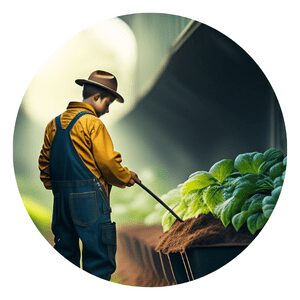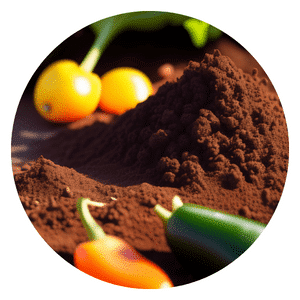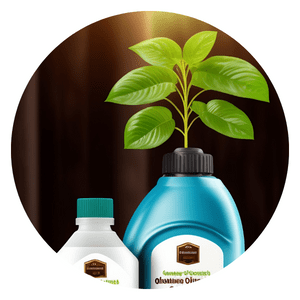How To Compost Cow Manure
Composting is an age-old practice that has gained popularity in recent years due to its numerous environmental benefits.
Not only does it reduce waste and landfill usage, but it also provides a sustainable solution for enriching soil fertility.
When it comes to composting, cow manure is considered one of the best organic materials available.
It is rich in nutrients, abundant, and easy to source from farms or local suppliers.
In this article, we will explore the step-by-step process of composting cow manure, highlighting the key considerations and techniques required for successful decomposition.
Cow Manure Composting Menu
Collect the Manure
Once you have identified a reliable source of cow manure, it is important to gather it efficiently for composting.
The best type of manure to use for composting is well-aged or composted manure. This means that the manure has been left to decompose over time, allowing beneficial bacteria and fungi to break down the organic matter and transform it into nutrient-rich compost.
Well-aged manure is less likely to contain harmful pathogens or weed seeds, which can interfere with the composting process.
When collecting cow manure, make sure to wear gloves and protective clothing to minimize contact with any potential pathogens.
Use a pitchfork or shovel to scoop up the manure from the source and transfer it into a sturdy container or wheelbarrow for transportation.
It is important not to overload your container as this can make it difficult to handle and transport safely.
To ensure proper decomposition, aim for a ratio of about 3 parts carbon-rich materials (such as straw or wood chips) to 1 part cow manure in your compost pile. This will create an optimal balance between nitrogen-rich materials (provided by the manure) and carbon-rich materials (needed for proper decomposition).
By using well-aged or composted cow manure in your composting process, you are maximizing its potential benefits while minimizing any potential risks associated with fresh manure.
Choose a Composting Method
When it comes to composting cow manure, choosing the right method is crucial.
One option is to use a compost bin, which provides a contained space for the manure to decompose. This method works well if you have limited space and want to keep the process neat and organized.
Another option is a compost pile, where you can simply pile up the manure in an open area and let it break down naturally over time. This method is ideal if you have a large amount of cow manure to compost.
If you prefer a more specialized approach, consider using a tumbler or vermicomposting system for your cow manure composting needs.
A tumbler allows for easy turning and mixing of the manure, ensuring efficient decomposition.
On the other hand, vermicomposting involves using worms to break down the manure into nutrient-rich castings. This method requires less space but requires careful monitoring of moisture levels and worm population.
Ultimately, the choice of composting method depends on your specific needs and resources available.
Consider factors such as space availability, amount of cow manure produced, level of involvement required, and desired end product when deciding on the best composting method for your cow manure.
Mix with Carbon-Rich Materials
Mixing cow manure with carbon-rich materials is essential in the composting process to create a balanced and nutrient-rich mixture.
Cow manure, being high in nitrogen, can become too dense and compacted if used alone, resulting in an unpleasant odor and slow decomposition.
By adding carbon-rich materials such as straw, dried leaves, or wood chips, you create a more ideal environment for microbial activity.
The carbon-to-nitrogen ratio (C:N ratio) is crucial in composting cow manure effectively. A C:N ratio of around 30:1 is generally recommended for optimal decomposition.
The addition of carbon-rich materials helps balance out the high nitrogen content of cow manure by providing a source of energy for the microorganisms working to break down organic matter.
Straw is commonly used as a carbon source due to its availability and ability to maintain airflow within the compost pile.
Dried leaves are another excellent choice as they provide both structure and insulation while contributing to the overall carbon content.
Wood chips not only offer good aeration but also add bulkiness that prevents compaction while allowing moisture retention.
By mixing cow manure with these carbon-rich materials, you foster an ideal environment for beneficial microbes that break down organic matter efficiently. This results in faster decomposition and transformation into nutrient-rich compost that can be used to enhance soil quality and promote plant growth naturally.
In the pasture, cows roam and graze with glee, Leaving behind gifts of rich, organic debris. Collect their manure for a composting dance, Embrace its power, give your garden a chance. Build a pile that heats up with love's embrace, Add in some leaves and soil, keep it in space. Turn it gently, watch transformation unfurl, From cow’s humble offering to nature’s precious pearl.
Chappy The Gardener
Add Water
One important factor to consider when composting cow manure is the moisture level.
Cow manure should be moist, similar to a wrung-out sponge. This means that if the manure appears dry, it is essential to add water during the mixing process to achieve the right moisture level.
The moisture in the manure helps facilitate decomposition and provides an ideal environment for beneficial microorganisms to thrive.
However, it is crucial not to overdo it with water and avoid waterlogging the compost pile.
Excessive moisture can lead to anaerobic conditions, impeding proper decomposition and causing unpleasant odors.
To prevent waterlogging, it is recommended to add water gradually while monitoring the consistency of the mixture.
The goal is to maintain a balance where there is enough moisture for decomposition but without saturating the pile.
Overall, ensuring proper moisture levels in cow manure during composting plays a vital role in successful decomposition and producing high-quality compost.
By adding water as needed while being cautious not to overwater, you can create a favorable environment for beneficial organisms and achieve optimal results in your composting process.
Turn the Pile
Turning the compost pile is a crucial step in the process of composting cow manure.
By regularly turning or mixing the pile, you ensure that oxygen is evenly distributed throughout. This is important because decomposition requires oxygen to occur efficiently.
Without proper aeration, the pile can become compacted and anaerobic, leading to slower decomposition rates and unpleasant odors.
Furthermore, turning the pile every few weeks helps break down the manure faster.
As you mix the layers of cow manure with other organic materials such as straw or leaves, you create an ideal environment for beneficial microorganisms to thrive.
These microorganisms play a vital role in breaking down complex organic compounds present in cow manure into simpler forms that plants can readily absorb.
In addition to promoting decomposition and faster breakdown of cow manure, regular turning also helps distribute heat evenly throughout the compost pile. This is especially important if you are aiming for hot composting, where temperatures need to reach around 140-160°F (60-70°C).
Turning allows any cooler areas within the pile to come into contact with hotter sections, ensuring all parts of the compost receive sufficient heat for effective sterilization and weed seed destruction.
Overall, regularly turning or mixing your compost pile not only maintains oxygen levels but also accelerates decomposition and improves nutrient availability from cow manure for your plants.
Monitor Temperature and Moisture
Monitor Temperature and Moisture: Check the temperature of the compost pile using a compost thermometer.
The ideal temperature range for composting is between 130-160 F (54-71 C).
If the temperature is too low, below 130 F (54 C), it may indicate that the composting process is not happening efficiently.
In such cases, you can add more nitrogen-rich materials or turn the pile to increase aeration, which will help raise the temperature.
On the other hand, if the temperature rises above 160 F (71 C), it may indicate that there is too much nitrogen in the pile or insufficient moisture. This high heat can kill beneficial microorganisms and slow down decomposition.
To address this issue, you can add more carbon-rich materials like straw or dry leaves to balance out excess nitrogen and maintain moisture levels by regularly watering your compost pile.
By monitoring both temperature and moisture levels in your compost pile, you can ensure optimal conditions for decomposition.
Regularly checking these factors will help you make necessary adjustments to speed up or improve the composting process.
Proper monitoring also prevents potential issues such as foul odors or pests that may arise from imbalanced temperatures or inadequate moisture content in your cow manure compost.
Allow for Decomposition
Allowing for decomposition is an essential step in the process of composting cow manure.
It is important to understand that the time it takes for decomposition to occur can vary depending on various factors such as temperature, moisture levels, and the size of the compost pile. These factors play a significant role in determining how long it will take for cow manure to break down into nutrient-rich compost.
One critical factor that affects decomposition is temperature.
Maintaining a consistent temperature within this range can help accelerate the decomposition process.
Moisture levels also play a crucial role in decomposition.
Cow manure contains high amounts of nitrogen, but if the pile becomes too dry or too wet, it can hinder microbial activity and slow down decomposition.
It’s vital to maintain a moisture level of around 50-60% throughout the composting process by regularly monitoring and adjusting with water or adding bulking agents like straw or wood chips.
In conclusion, allowing sufficient time for cow manure to decompose is crucial in obtaining high-quality compost.
Factors such as temperature, moisture levels, and pile size need to be considered and properly managed during the composting process to ensure optimal conditions for microbial activity and efficient breakdown of organic matter into nutrient-rich humus.
Optional: Cover the Pile
Covering the compost pile with a tarp or other breathable material is an important step in the process of composting cow manure. This simple technique helps to retain moisture and heat, creating an optimal environment for decomposition.
The covering acts as a barrier, preventing excessive rainwater from saturating the pile and causing it to become waterlogged.
By retaining moisture, the covering also helps to speed up the decomposition process. Moisture is essential for microbial activity, which plays a crucial role in breaking down organic matter into nutrient-rich humus. Additionally, keeping the pile covered prevents valuable nutrients from leaching out due to heavy rainfall.
In addition to retaining moisture and heat, covering the compost pile can also help control unwanted odors.
Cow manure can emit strong smells as it decomposes, which may be unpleasant for those living nearby.
A tarp or other breathable material acts as a barrier between the pile and surrounding air, reducing odor dispersal and creating a more pleasant environment overall.
Overall, covering the compost pile with a tarp or breathable material is an essential practice when composting cow manure.
It helps retain moisture and heat while preventing excessive rainwater from saturating the pile.
By doing so, this technique accelerates decomposition and minimizes nutrient loss through leaching while also controlling unwanted odors emitted during decomposition.
Compost Maturity
Compost maturity is a crucial factor when it comes to composting cow manure effectively.
The process of composting involves breaking down organic matter into nutrient-rich soil amendments.
When the cow manure turns dark, crumbly, and has an earthy smell, it indicates that the process is nearing completion.
At this stage, the compost should no longer resemble fresh manure in appearance or odor.
Achieving compost maturity requires time and proper management of the compost pile.
Throughout the decomposition process, microorganisms break down the organic matter in the cow manure, creating heat as a byproduct.
As these microorganisms consume the readily available carbon sources in the manure, they begin to die off or move on to other food sources. This leads to a decrease in temperature within the pile and eventually results in mature compost.
The dark color of mature compost suggests that it has undergone sufficient breakdown of organic matter and is now rich in nutrients that plants can readily absorb.
Additionally, its crumbly texture indicates that it has reached a stable state where small particles easily separate from each other without clumping together.
The pleasant earthy smell is another indication of compost maturity as it signifies that harmful ammonia compounds have been broken down during decomposition.
Use in the Garden
Using fully matured cow manure compost in your garden can greatly benefit the growth and health of your plants.
The nutrient-rich composition of the compost provides essential elements that promote plant growth, such as nitrogen, phosphorus, and potassium.
By incorporating it into your garden soil, you are enriching the soil’s fertility and improving its structure.
To utilize cow manure compost effectively, apply it around the base of your plants or mix it into the soil before planting.
When applied around existing plants, it acts as a top dressing that slowly releases nutrients over time. This helps to feed the plants continuously and encourages robust growth.
Mixing cow manure compost into the soil before planting ensures that young seedlings receive an immediate nutrient boost, providing them with a strong start.
In addition to its role as a nutrient provider, using cow manure compost also enhances soil moisture retention and drainage capabilities.
The organic matter in the compost increases water-holding capacity in sandy soils while allowing excess water to drain away from heavy clay soils efficiently. This balanced moisture level supports healthy root development and reduces water stress on plants during dry periods.
By incorporating fully matured cow manure compost into your garden soil, you are not only improving its fertility but also enhancing overall plant performance through increased nutrient availability and improved moisture management capabilities.
In conclusion, composting cow manure is a sustainable and beneficial practice for both farmers and the environment.
By properly composting cow manure, farmers can harness its nutrient-rich qualities to improve soil health and fertility, ultimately leading to higher crop yields.
Additionally, composting cow manure helps reduce odors and prevent the release of harmful pollutants into the air and waterways.
With the right techniques and management, anyone can successfully compost cow manure at home or on a larger scale.
So why not start today and contribute to a more sustainable future by turning cow manure into valuable organic matter for your garden or farm?
Click To Grow
Helps Us Grow – Share If You Like
















